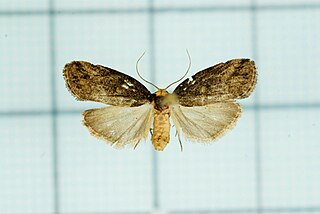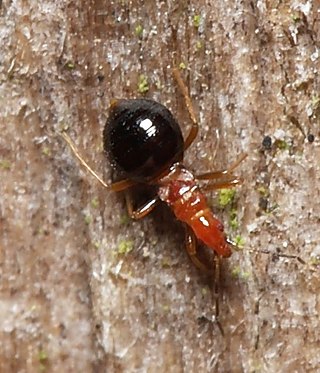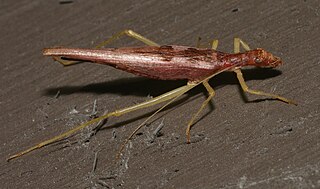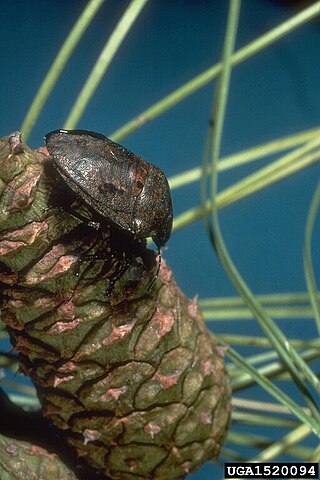
Adalia bipunctata, the two-spot ladybird, two-spotted ladybug or two-spotted lady beetle, is a carnivorous beetle of the family Coccinellidae that is found throughout the holarctic region. It is very common in western and central Europe. It is also native to North America but it has heavily declined in many states and provinces. It is commonly introduced and imported as a biological control agent.

Adalia is a genus of ladybugs in the family Coccinellidae. It contains only two species, A. bipunctata and A. decempunctata.

Eugoa is a genus in the family Erebidae, subfamily Arctiinae. The genus was erected by Francis Walker in 1858. They are found in India, Sri Lanka, Myanmar and Borneo.

Haptogenys bipunctata is a species of combtooth blenny found in the western Pacific and Indian Oceans. It is the only known member of its genus.

Loricula is a genus of minute bladder bugs in the family Microphysidae. There are more than 20 described species in Loricula.

Macrosiagon is a genus of wedge-shaped beetles in the family Ripiphoridae. There are more than 20 described species in Macrosiagon. Under the rules of the ICZN, the nomenclatural gender of the genus name is feminine, as it is based on the Greek word "siagon" (σῐᾱγών), for "jaw", which is feminine in gender, despite recent publications erroneously treating the gender as neuter

Nitidula is a genus of sap-feeding beetles in the family Nitidulidae. There are more than 20 described species in Nitidula. Some species breed in carrion while others are associated with later stages of decay in mammalian corpses and can be used in forensic investigations.

Neoxabea bipunctata, the two-spotted tree cricket, is a species of tree cricket in the family Gryllidae. It is found in North America.

Neoxabea is a genus of smooth-legged tree crickets in the family Gryllidae. There are about 14 described species in Neoxabea.

Nitidula bipunctata, the two-spotted sap beetle, is a species of sap-feeding beetle in the family Nitidulidae. It is found in Europe and Northern Asia and North America.
Forcipomyia bipunctata is a species of biting midges from Europe and North America.

Martinapis is a genus of long-horned bees in the family Apidae. There are at least three described species in Martinapis.

Tetyra is a genus of shield-backed bugs in the family Scutelleridae. There are about seven described species in Tetyra.
Loricula bipunctata is a species of minute bladder bug in the family Microphysidae. It is found in Europe and Northern Asia and North America.
Seira bipunctata is a species of slender springtail in the family Entomobryidae.

Tetyra bipunctata, the shieldbacked pine seed bug, is a species of shield-backed bug in the family Scutelleridae. It is found in Central America and North America.
Arthroplea bipunctata is a species of flatheaded mayfly in the family Arthropleidae. It is found in North America.
Arthroplea is a genus of flatheaded mayflies in the family Arthropleidae. There are at least two described species in Arthroplea.

Chiridopsis bipunctata, commonly known as Indian green tortoise beetle or sweetpotato tortoise beetle, is a species of leaf beetle found in India, Thailand and Sri Lanka. They are often seen on plants in the family Convolvulaceae.

Ceropales bipunctata, the Two-Speckled Cuckoo Spider Wasp, is a species of diurnal, kleptoparasitic spider wasp in the family Pompilidae. It is an obligate kleptoparasite, meaning that it must rely on the captured provisions of other spider wasps and cannot capture its own. It is found on the Atlantic Coast of North America, north to New Brunswick, Canada. It feeds on nectar primarily from goldenrods, and also other common nectaring plants. It is known to lay an egg on the prey of other pompilids, including the two species Anoplius cleora and Anoplius aethiops. Eggs are laid in the book lung of the spider. These wasps also sometimes lay an egg on prey from spider-hunting wasps in the family Sphecidae.













